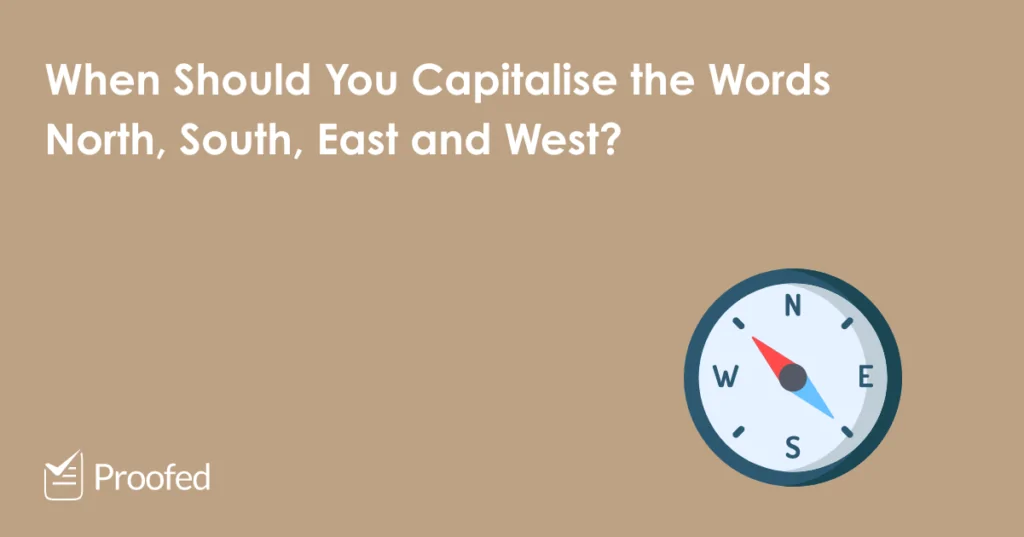Should compass directions (i.e. north, south, east, and west) ever be capitalised? And if so, when? To find out when to capitalise ‘North’, ‘South’, ‘East’ and ‘West’, read our guide to capitalising directions below.

North, South, East and West as Directions
When ‘north’, ‘south’, ‘east’ and ‘west’ refer to generic directions (i.e. the points of the compass), they are not capitalised:
Scotland is to the north of England.
We walked south for three miles.
The sun always sets in the west.
The master bedroom is in the east wing of the mansion.
The same applies for related adjectives and other compass directions:
There will be a northerly wind tomorrow.
We live in the eastern part of the country.
The castle lies to the south-west.
The key factor here is that we’re using these words descriptively (i.e. to specify the direction or location of something), not to name something.
North, South, East and West as Proper Nouns
You should capitalise ‘North’, ‘South’, ‘East’ and ‘West’ when they’re part of a proper noun (i.e. the name of a unique thing). The obvious examples of this are countries, states, cities, and other geographical areas:
We study the history of Eastern Europe.
Find this useful?
Subscribe to our newsletter and get writing tips from our editors straight to your inbox.
I’m visiting South Africa next year.
He comes from North Dakota.
Westward Ho! is a village in the UK.
However, some people also suggest capitalising the names of:
- Broad geographical regions (e.g. ‘the North’ or ‘the Far East’)
- People from a specific region (e.g. ‘Northerners’, ‘Southerners’)
- Cultures or movements related to a region (e.g. ‘Western philosophy’)
The uniting theme here is the idea of naming a well-known or well-defined region. In some cases, like country and city names, this is clear. But in other cases, it is more a matter of convention and habit.
For example, most people would capitalise ‘South London’ because South London is a well-known part of a famous city. But it would be unusual to do this for a less well-known location, such as ‘south Coventry’.

There is room for variation here: if you live in Coventry and you’re writing for other Coventry residents, then perhaps writing ‘South Coventry’ would make sense. But, generally, you only need to capitalise a direction in a place name if the direction is a standard part of the place’s name.
Summary, Style Guides and Proofreading
To summarise the advice above, we suggest:
- Capitalising ‘North’, ‘South’, ‘East’ and ‘West’ when they’re part of a proper noun (i.e. the name of a specific geographical region or culture).
- Not capitalising when referring to a general direction.
However, capitalisation may depend on the style guide you’re using. The Chicago Manual of Style and the MLA Handbook, for instance, say to only capitalise ‘Southern’ when referring to the American Civil War. But the AP Stylebook says to always capitalise ‘Southern’ when referring to ‘the South’ in the United States, regardless of whether you’re discussing the Civil War.
In other words, directions can be tricky! In all cases, though, you should:
- Check your style guide (if applicable) for advice on specific terms.
- Be consistent (e.g. don’t use ‘south England’ in one part of a document and ‘South England’ in another if you’re referring to the same place).
And if you need help, our expert proofreaders are ready! You can even submit a sample document for free to see how our services work.



